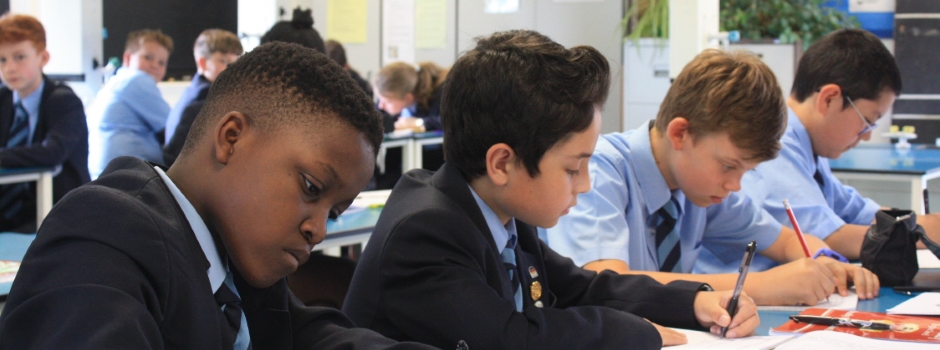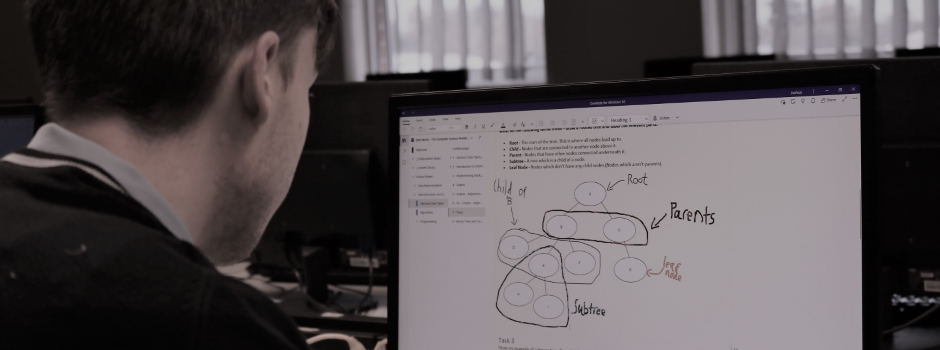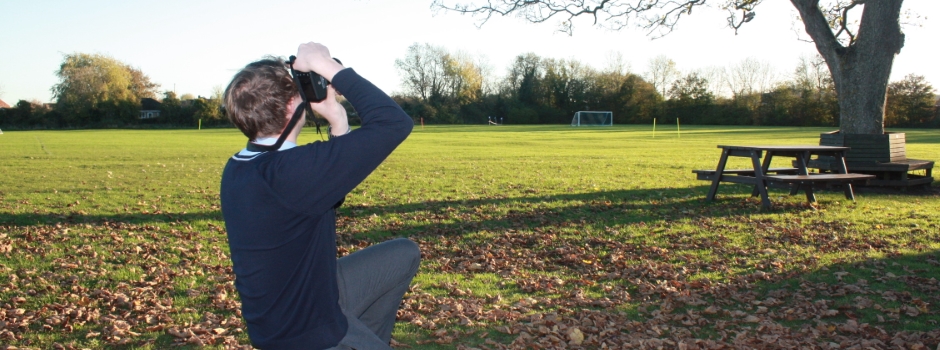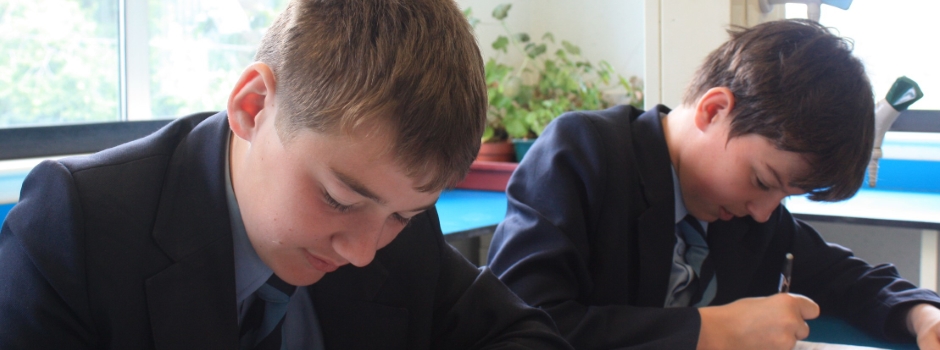



















































"The support from staff and students allows you to exceed your expectations."
Year 7 - Curriculum on a Page
Showing the curriculum by year
Year 7 Curriculum Details - 2024/2025 (Current)
| Subject | Term 1 | Term 2 | Term 3 | Term 4 | Term 5 | Term 6 |
| Art | The Skull Project: Year 7 students will be introduced to Observational Drawing & Observational Drawing Skills such as Schematic Drawing and Construction Lines. Students will develop their use of tone and how to convey tone within their observational drawing's using mark-making and dry materials. | The Skull Project: Year 7 students will develop on the skills learnt in Term 1 by developing a range of ideas that link to a historical or, contemporary Artist's work, demonstrate their knowledge and further their handling of materials to form a well-rounded and meaningful Final Piece. | Gargoyles & Grotesques: Utilising former Observational Drawing Skills, students will study John Taylor-Arms whilst learning about the history of Lincoln Cathedral. Responding to a Design Brief set by Lincoln Cathedral, students will create a Mono-Print which discusses current global matters. | Perspective: Year 7 students will create an imaginative interior bedroom using one-point perspective. Learning about the work of Victor Vasarely; students will create a work inspired Vasarely and present their understanding of colour theory. | The Pop Art Project: Year 7 Students will be introduced to the Pop Art Movement. Transcribing food-inspired works made famous by Andy Warhol & Claus Oldenburg using Collage and Relief techniques. Students will refine their material handling through maquette making. | The Pop Art Project: Year 7 Students will demonstrate their knowledge as well as, their handling of materials to form a well-rounded and meaningful Final Piece; a 3D sculpture referencing Claus Oldenburg's Giant Pop Art food inspired works. |
| Business Studies | Introduction to Business Studies - goods/services, production processes, business sectors, gap in the market. Alford project which involves planning for and conducting primary and secondary research, summarising their finding and creating a business idea that would fill a gap in the market. | Objectives of a business. Deciding on products their Alford shop would sell considering cost of buying, mark up and selling price, profit/loss and fixed/variable costs. To confidently understand financial terms and be able to make basic calculations. Enterprise and entrepreneurship. | Revision and Jan exam. To understand what advertising is and the different methods which can be used. Create a slogan and radio advert for their Alford shop. Perform these to the class. | Introduction to the marketing mix - product, price, place, promotion. Introduce ownership types relating to Cadbury and introduce the Cadbury Project to student. | Conduct some research into Cadbury - timeline, marketing mix. Project - create your own chocolate bar idea. Students have the opportunity to physically make this during the holidays. | Cadbury World Trip including a trip report. Extension strategies, and production methods including job and flow production. Practical tasks will be used to teach this, followed by quality control methods. |
| Computing | Network Introduction and eSafety/Cyber Security - this covers how to use our main digital systems as well as introducing some potential eSafety issues and how to avoid them becoming a problem. | Initial Assessment of problem solving skills using the Bebras Algorithms - Looking at what an algorithm is and some common uses for algorithms - concentrating on searching and sorting. | Programming 1 - an introduction to Python using turtle as well as variables, data types and for loops | Programming 1 - continued. | Spreadsheets - using Microsoft Excel to calculate results as well as displaying data as graphs. | Word Processing - we look at the advanced features of Microsoft Word to produce professional looking documents quickly. Also a chance to revisit keyboard skills. Data Representation 1 - binary, denary and hexadecimal number systems. |
| Design Technology | Health and safety in the workshop and with tools - Craft Knife Motions and Linkages - Technical Knowledge Creating a storyboard - Investigate Rendering skills- adding shade and colour to give a realistic effect - Design | Paper mechanisms - Technical Knowledge - V-fold - sliders Creating a pirate pop-up book - Make Peer assessing and evaluating work - Evaluate | Introduction to woodworking tools. - bench hook - tenon saw Natural Timbers - hardwood - softwood - Technical knowledge Marking and measuring accurately - steel rule - Tri-square Making a wooden box - Making | Introduction to smoothing and shaping. - Linisher - sandpaper. Manmade timbers - manufactured boards. - Technical Knowledge Applying surface finishes to timbers. - Beeswax Evaluating practical work. - Evaluate | Introduction to workshop tools - the pillar drill. Different types of cams and their uses. - Technical knowledge | Introduction to 2D design - CAD skills. |
| English | Where did our stories come from? Literary Heritage unit including Beowulf, the Greek Myths, Shakespeare and Tennyson | Literary Heritage unit;
The Power of Language: an introduction to rhetoric Careers: Publishing & Editing (Unifrog) | The Outsider in Literature & the Bildungsroman
Modern Novel study – The Graveyard Book | Literature in performance: supernatural poems and performance poetry
Careers: Performance Arts | Worlds & Lives: non-fiction autobiographies of adventure and challenge | The Bildungsroman - Treasure Island (playscript)
Careers in the theatre / stage design |
| French | All about me: give personal information including languages, nationalities and appearance Grammar: nouns, adjectives, key verbs. | Personality, family, school and friendships Grammar: agreements, connectives, comparisons | School, leisure activities, pets and animals Food and drink: likes and dislikes in food and drink, restaurant dishes in France Grammar: negatives, modal verbs, perfect tense | My neighbourhood: places in town, activities you can do, ask and give directions, inviting people out Grammar: prepositions, adjectives | My style: clothes, fashion, shopping, and musical tastes Grammar: reflexive verbs, present tense, possessive adjectives | Holidays and festivals Grammar: future, I would like, perfect tense |
| Geography | Think like a geographer: What is Geography? Where do places begin? OS map skills; 4 and 6 figure grid references, distance, direction, and height | Place Studies: The place I go to school The place I live Places in the UK Latitude and longitude Places in Europe and worldwide | The World of Work: Employment Sectors Globalisation The Geography of Football Careers: Types of jobs and how jobs are influenced by globalisation | Tourism: Tourism in Europe Impacts of Tourism Seaside Resorts Sustainable Tourism Careers: Tourism and Hospitality (Unifrog) | Coastal Landscapes: Weathering and Erosion Erosional Landforms Longshore drift and depositional landforms Cause and effect of cliff collapse Coastal management Issue evaluation: The defence dilemma | Exploring Russia & The Middle East: Locations Physical Features Climate Zones and Biomes The People |
| History | Start with a short introductory unit focusing on core skills that will be covered in the year; chronology, units of time, source types and use as well as source analysis and evaluation. Content focuses on medieval Britain and starts with an evaluation of the claims to the throne in 1066. | The events of 1066 will be covered, focusing on the reasons why the Normans were successful in the battle of Hastings. The Norman use of terror to gain power after Hastings will be considered, with a special focus on evaluating castle designs. | The medieval theme continues with a study on the importance of religion, by focusing on the issues surrounding the murder of Thomas Becket. This leads to an investigation on the challenging of royal power culminating in the Magna Carta (with a focus on interpretations of King John's reign). | The term looks at the social issues of medieval Britain, with a case study of the Bubonic Plague outbreak in 1349. This will involve a study of its causes, the symptoms, contemporary treatments and its wider impact. | The last aspect of medieval Britain concentrates on the Peasants' Revolt, with a focus on its causes, the events and its impact on socio-economic and political aspects of Britain. | A study of the early Tudor period, 1485 to 1553, with an emphasis on the Reformation and the reasons behind it. How the church changes will be analysed and students will be expected to learn the key features of Tudor chronology (such as who, length of reign, marriage and siblings). |
| Mathematics | BASELINE ASSESSMENT Unit 1: Analysing & Displaying Data - Bar charts, two way tables, pie charts, averages & range. Links to STEM Unit 2: Number Skills - Factors, primes and multiples, directed numbers, basic calculations, squares, powers & roots | Unit 3: Equations, Functions & Formulae – Writing & simplifying algebraic expressions, brackets, powers & factorising. STEM link -writing and using formulae Unit 4: Fractions – Operations with fractions and mixed numbers, fraction/decimal/percentage conversions. TERM ASSESSMENT | Unit 5: Angles & Shape – Angles rules in parallel lines, triangles and polygons. Unit 6: Decimals – Ordering, rounding, operations with and conversions between fractions, decimals and percentages. FINANCE Link – working with percentages. TERM ASSESSMENT | Unit 7: Equations – Solving one & two step equations, work with more complex equations. TERM ASSESSMENT | Unit 8: Multiplicative Reasoning – Ratios, proportion, unitary method. STEM link – metric & imperial units. Unit 9: Perimeter, area & volume - Triangles, parallelograms, trapeziums, Composite shapes, 3D solids, surface area, volume. STEM link – measures TERM ASSESSMENT | Unit 10: Sequences & Graphs – Sequences, nth term, pattern sequences, coordinates & line segments, graphs. ASSESSMENT – end of year test |
| Physical Education (non exam) | Football, Netball and Games Techniques and strategic play to outwit opponents, essential elements of attack and defence and refereeing small sided games. | Cross country Football, Netball, Rugby, Dance Techniques and strategic play to outwit opponents, essential elements of attack and defence and refereeing small sided games. Understanding of dance movements and choreography | Badminton and Fitness Techniques and strategic play to outwit opponents in net games. Understanding of the benefits of physical activity, the structure of training programmes and variety in types of exercise. | Table tennis, basketball and hockey Techniques and strategic play to outwit opponents in court and net games. | Athletics. Develop techniques in running, throwing and jumping events and improve personal best. Demonstrate the essential elements of an event and accurately time/measure and officiate competitions. | Cricket and Rounders. Develop techniques and refine strategic play to outwit opponents, demonstrate the essential elements of batting, bowling and fielding, and accurately umpire small sided games. |
| PSHE | HEALTH & WELLBEING Transition and Safety Transition to secondary school, settling-in, core values and personal safety in and outside school, supported by a Stay Safe Day later usually in March | LIVING IN THE WIDER WORLD Developing Skills and Aspirations Careers, teamwork, enterprise skills, and raising aspirations. First aid is also included this term - an introduction to various scenarios and basic first aid in each | REALTIONSHIPS Diversity How to challenge prejudice, stereotypes and discrimination the signs and effects of all types of bullying, including online how to respond to bullying of any kind, including online how to support others | LIVING IN THE WIDER WORLD Financial Decision Making (careers) Saving, borrowing, budgeting and making financial choices | RELATIONSHIPS Building Relationships Self-worth, romance and friendships (including online), relationship boundaries, healthy and unhealthy relationships, consent, manipulative behaviour including sexting and the law. | HEALTH & WELLBEING Health and Puberty Healthy routines, influences on health, puberty, unwanted contact, and FGM |
| Religious Studies | Why study RS? What can I do with RS? (Links with Careers) Exploring religion in British society. What is Belief? Understanding religious pluralism, inclusivism and exclusivism. | Philosophy: Does God exist? Cosmological, teleological, and moral arguments; atheism and agnosticism. | Theology: God and miracles. Explore divine action through miracles. What is a miracle? Biblical examples, modern claims, and theological interpretations. | Religion: Life After Death in Christianity. Judgement, heaven, hell, purgatory; Christian views on the soul and resurrection. | Good and Evil. What sort of attitudes result from being religious? What attitudes do religious people have to: themselves; life; God; life after death; right and wrong; truth? | Exploring religion, faith and community. Beliefs and Practices of Christianity or another World Religion. (Guided student choice) |
| Science | Introduction to science. Biology 1 - Cells and microscopes: Cell organelles, diffusion, unicellular life, skeleton, muscles and joints. Science key skills. | Chemistry 1 - Particle theory, atoms and elements: Properties of matter, particles, pressure, changing state, classifying materials. Physics 1 - Forces: Squashing, stretching, drag, friction, Hooke's law, resultant forces. Science key skills. | Biology 2 - Reproduction and variation: Reproductive systems, menstrual cycle, pregnancy, drug development, plant reproduction. Chemistry 2 - Compounds and mixtures: Physical and chemical changes, oxidation, combustion, conserving mass, mixtures, filtration, chromatography, distillation. Key skills. | Physics 2 - Energy: What is energy, generating electricity, cost of electricity, series and parallel circuits, Ohm's law. Science key skills. | Biology 3 - Plants and photosynthesis: What is photosynthesis, leaf structure, soil nutrients, fertilisation and seed dispersal, food chains and webs, interdependence. Science key skills. | Chemistry 3 - Chemistry of the earth and atmosphere: structure of the Earth, rock types, atmosphere, carbon cycle, natural resources. Physics 3 - Waves: What are waves, light waves, cameras, eyes, sound waves, hearing, splitting light. Science key skills. |